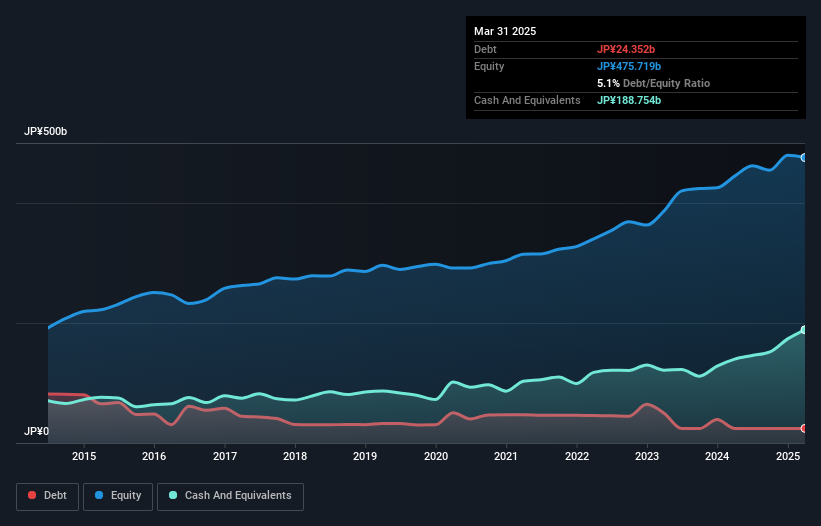- Japan
- /
- Electronic Equipment and Components
- /
- TSE:6841
Is Yokogawa Electric (TSE:6841) A Risky Investment?
Some say volatility, rather than debt, is the best way to think about risk as an investor, but Warren Buffett famously said that 'Volatility is far from synonymous with risk.' When we think about how risky a company is, we always like to look at its use of debt, since debt overload can lead to ruin. We note that Yokogawa Electric Corporation (TSE:6841) does have debt on its balance sheet. But should shareholders be worried about its use of debt?
We check all companies for important risks. See what we found for Yokogawa Electric in our free report.When Is Debt A Problem?
Generally speaking, debt only becomes a real problem when a company can't easily pay it off, either by raising capital or with its own cash flow. Ultimately, if the company can't fulfill its legal obligations to repay debt, shareholders could walk away with nothing. However, a more usual (but still expensive) situation is where a company must dilute shareholders at a cheap share price simply to get debt under control. Of course, the upside of debt is that it often represents cheap capital, especially when it replaces dilution in a company with the ability to reinvest at high rates of return. The first step when considering a company's debt levels is to consider its cash and debt together.
What Is Yokogawa Electric's Debt?
The chart below, which you can click on for greater detail, shows that Yokogawa Electric had JP¥24.4b in debt in March 2025; about the same as the year before. However, it does have JP¥188.8b in cash offsetting this, leading to net cash of JP¥164.4b.

How Healthy Is Yokogawa Electric's Balance Sheet?
Zooming in on the latest balance sheet data, we can see that Yokogawa Electric had liabilities of JP¥197.8b due within 12 months and liabilities of JP¥44.8b due beyond that. Offsetting this, it had JP¥188.8b in cash and JP¥233.7b in receivables that were due within 12 months. So it actually has JP¥179.9b more liquid assets than total liabilities.
This excess liquidity suggests that Yokogawa Electric is taking a careful approach to debt. Due to its strong net asset position, it is not likely to face issues with its lenders. Succinctly put, Yokogawa Electric boasts net cash, so it's fair to say it does not have a heavy debt load!
See our latest analysis for Yokogawa Electric
The good news is that Yokogawa Electric has increased its EBIT by 6.1% over twelve months, which should ease any concerns about debt repayment. There's no doubt that we learn most about debt from the balance sheet. But it is future earnings, more than anything, that will determine Yokogawa Electric's ability to maintain a healthy balance sheet going forward. So if you're focused on the future you can check out this free report showing analyst profit forecasts.
Finally, a company can only pay off debt with cold hard cash, not accounting profits. Yokogawa Electric may have net cash on the balance sheet, but it is still interesting to look at how well the business converts its earnings before interest and tax (EBIT) to free cash flow, because that will influence both its need for, and its capacity to manage debt. Over the most recent three years, Yokogawa Electric recorded free cash flow worth 64% of its EBIT, which is around normal, given free cash flow excludes interest and tax. This free cash flow puts the company in a good position to pay down debt, when appropriate.
Summing Up
While we empathize with investors who find debt concerning, you should keep in mind that Yokogawa Electric has net cash of JP¥164.4b, as well as more liquid assets than liabilities. So we don't think Yokogawa Electric's use of debt is risky. Over time, share prices tend to follow earnings per share, so if you're interested in Yokogawa Electric, you may well want to click here to check an interactive graph of its earnings per share history.
At the end of the day, it's often better to focus on companies that are free from net debt. You can access our special list of such companies (all with a track record of profit growth). It's free.
New: Manage All Your Stock Portfolios in One Place
We've created the ultimate portfolio companion for stock investors, and it's free.
• Connect an unlimited number of Portfolios and see your total in one currency
• Be alerted to new Warning Signs or Risks via email or mobile
• Track the Fair Value of your stocks
Have feedback on this article? Concerned about the content? Get in touch with us directly. Alternatively, email editorial-team (at) simplywallst.com.
This article by Simply Wall St is general in nature. We provide commentary based on historical data and analyst forecasts only using an unbiased methodology and our articles are not intended to be financial advice. It does not constitute a recommendation to buy or sell any stock, and does not take account of your objectives, or your financial situation. We aim to bring you long-term focused analysis driven by fundamental data. Note that our analysis may not factor in the latest price-sensitive company announcements or qualitative material. Simply Wall St has no position in any stocks mentioned.
About TSE:6841
Yokogawa Electric
Provides industrial automation, and test and measurement solutions in Japan, Southeast Asia, the Far East, China, India, Europe, CIS countries, North America, the Middle East, Africa, and Central and South America.
Flawless balance sheet with proven track record and pays a dividend.
Similar Companies
Market Insights
Community Narratives


Recently Updated Narratives

Constellation Energy Dividends and Growth

CoreWeave's Revenue Expected to Rocket 77.88% in 5-Year Forecast

Bisalloy Steel Group will shine with a projected profit margin increase of 12.8%
Popular Narratives


MicroVision will explode future revenue by 380.37% with a vision towards success


NVDA: Expanding AI Demand Will Drive Major Data Center Investments Through 2026



